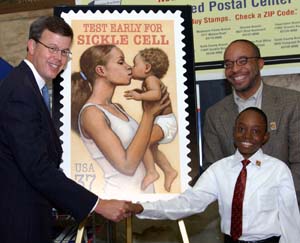
Sickle cell disease presents devastating problems — and no easy solutions.
An inherited disorder of the red blood cells, sickle cell disease is the most common genetic disorder in African-Americans. One in every 400 African-Americans are born with the disease, and more than 2.5 million Americans carry the sickle cell trait that may be passed on to their children.
In sickle cell disease, instead of their normal round shape, red blood cells are a curved, or sickle-shape. Sickle-shaped cells become stuck in blood vessels, causing damage to tissues and organs, which can be extremely painful.
In addition to pain, the most common complications associated with sickle cell disease are strokes, kidney and spleen dysfunction, chronic anemia and increased risk of bacterial infection. Stroke is the most feared complication. Children as young as 2 can have strokes and require monthly — or even more frequent — blood transfusions.
Pediatric hematologist Michael R. DeBaun, M.D., at Washington University School of Medicine in St. Louis says the ability to provide ongoing blood transfusion therapy is vitally important for children with sickle cell disease, and treatment requires a sufficient supply of blood from African-American donors.
“African-Americans often have subtle differences in red blood cell proteins, making it more likely that an appropriate donor will come from someone with a similar ethnic background,” says DeBaun, also an associate professor of pediatrics and of biostatistics at Washington University and a staff physician at St. Louis Children’s Hospital.
“Black History Month is an ideal time to encourage African-Americans to come out and donate blood,” he says.
In an effort to increase the African-American blood supply, DeBaun and his team have long been dedicated to both educating the African-American community about the critical need for blood donations and encouraging greater donor participation.
DeBaun has founded programs in Missouri that he hopes can become national models. The Charles Drew Community Blood Donation Campaign began in 1999 in an effort to encourage local minority groups — a historically untapped resource — to actively donate blood. The program is funded by a National Institutes of Health (NIH) grant and is named after Charles Drew, the African-American scientist who pioneered the field of blood plasma preservation and storage.
DeBaun and his team also have launched Sickle Cell Sabbath, a spiritual outreach program led by Washington University School of Medicine that educates the African-American faith community about sickle cell disease and the importance of blood donations.
Sickle Cell Sabbath blood drives are held in Missouri on Sundays from February — in honor of Black History Month — through June — the birthday of Charles Drew.
Both the Charles Drew and Sickle Cell Sabbath campaigns to increase blood donations have been successful.
In the early 1990s, African-Americans in Missouri donated only 1,200 units of blood annually. Now — thanks to these programs — approximately 9,000 units of blood from African-Americans are collected each year.

“We predict that the number of African-American blood donors in Missouri will increase by 300 percent over the next three years,” DeBaun says.
Through these programs and other educational efforts, DeBaun’s team also aims to increase cord-blood donations from African-Americans by at least 10 percent in the St. Louis region.
And their efforts stretch beyond the state of Missouri.
Children with sickle cell disease around the world will benefit from the $18.5 million NIH grant to study the effectiveness of blood transfusion therapy as a treatment for preventing silent strokes.
Silent strokes, which frequently go unrecognized, are one of the most devastating complications associated with sickle cell disease. They can cause declines in school performance, increased forgetfulness and a diminished ability to follow even simple instructions.
The international clinical trial — underway at 24 institutions, including sites in France, Canada and England — will allow DeBaun and an international team of scientists to better understand the genetic basis of sickle cell disease and to find the best treatment for children with silent strokes.
“Regardless of the outcome of the study, our results will change the standard of care for children with sickle cell disease throughout the world,” says DeBaun, the study’s principal investigator. “We will learn whether blood transfusion therapy will prevent silent strokes in children with sickle cell disease.”
His team has recently completed a pilot trial showing that blood transfusion therapy is a safe and potentially effective therapy for children with silent strokes.
In an another effort to put sickle cell disease in the national spotlight, DeBaun and his team have worked closely with Missouri Senator Jim Talent to pass the Sickle Cell Treatment Act.
The comprehensive health-care legislation, initiated and led by Talent, will increase funding for treatment and research efforts, expand awareness about the disease, and provide counseling about who is at risk for having a child with the disease. The bill became law in October 2004.
The legislation also enhances the number of services available to sickle cell disease patients by allowing states to receive a federal 50-50 funding match for treatment expenses such as genetic counseling, community outreach and education.
“We have a once-in-a-lifetime opportunity not only to improve the quality of life for the vulnerable children afflicted with this disease but also to change the understanding of sickle cell disease for future generations of children and the pediatricians who treat them,” DeBaun says.
“Sickle cell disease has been under the radar for far too long. Black History Month is the ideal time to shine the national spotlight on this disease by empowering people with knowledge and groundbreaking research that someday will lead to a cure.”
Washington University School of Medicine’s full-time and volunteer faculty physicians also are the medical staff of Barnes-Jewish and St. Louis Children’s hospitals. The School of Medicine is one of the leading medical research, teaching and patient care institutions in the nation, currently ranked second in the nation by U.S. News & World Report. Through its affiliations with Barnes-Jewish and St. Louis Children’s hospitals, the School of Medicine is linked to BJC HealthCare.